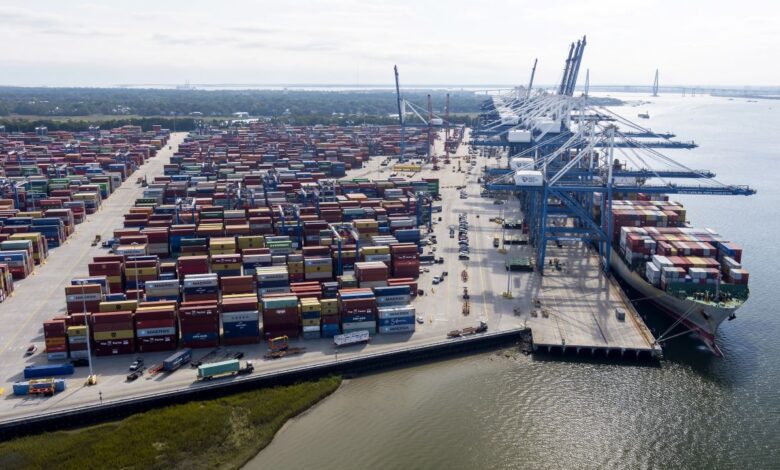
A looming strike by roughly 45,000 unionized dockworkers at seaports on the East and Gulf coasts could begin next week and disrupt shipments of a variety of products as the presidential election approaches.
One-half of the seaborne imports to the U.S. are shipped through the 36 ports that would be impacted by a strike that may begin on Oct. 1. It would be the first strike by the International Longshoremen’s Association (ILA), which represents the port workers, since 1977.
The union and the U.S. Maritime Alliance (USMX), which represents port employers, are at an impasse over wages in a new contract. As of Sunday, talks between the ILA and USMX appeared to be at a standstill, with each issuing statements about the impasse.
If the strike occurs next week, it would disrupt billions of dollars in imports ranging from cars and auto parts to agricultural commodities and consumer goods. The potential work stoppage comes as the U.S. election season heats up and Americans begin planning purchases for the upcoming holiday season.
The ports that would be affected by the strike handled $37.8 billion in vehicle imports in the 12-month period through the end of June 2024, according to S&P Global Market Intelligence.
The Port of Baltimore leads the nation in car shipments, while auto parts are also a major import on the East Coast and Gulf of Mexico. Those ports also lead the U.S. in shipments of machinery, fabricated steel and precision instruments, according to S&P Global Market Intelligence data.
Agricultural products are also a significant import, as three-quarters of U.S. banana imports are from countries like Guatemala and Ecuador, Jason Miller, interim chair of Michigan State University’s department of supply chains, told Reuters.
BIDEN WON’T BLOCK POTENTIAL PORT STRIKES ON EAST AND GULF COAST
There would also be an impact on the $18.5 billion U.S. beef and pork export industry and the $5.8 billion poultry and egg export sector that is shipped in refrigerated containers.
Roughly 45% of all waterborne U.S. pork exports and 30% of beef exports were shipped via East Coast and Gulf Coast ports in the first seven months of this year, said U.S. Meat Export Federation spokesperson Joe Schuele.
In the pharmaceutical industry, over 91% of containerized imports and 69% of containerized exports of U.S. pharmaceutical products are handled by the affected ports, according to Everstream Analytics. More than 1-in-3 containers exported from the U.S. with life-saving medications leave from the Port of Norfolk in Virginia, while nearly 30% of containerized pharmaceutical imports enter the U.S. at the Port of Charleston in South Carolina, the firm noted.
US ECONOMIC TOLL OF EAST COAST AND GULF PORT STRIKE COULD BE BILLIONS PER DAY, TRADE EXPERT WARNS
Ports that would be affected by a strike bring in over half of the knitted and non-knitted apparel imported to the U.S., which is valued at $32.8 billion combined, as well as furniture valued at $23.4 billion, according to S&P Global Market Intelligence.
The White House previously signaled that President Biden wouldn’t invoke the Taft-Hartley Act to impose a cooling-off period under which workers would go back to work for 80 days while negotiations continue.
GET FOX BUSINESS ON THE GO BY CLICKING HERE
“Since taking office, the Biden-Harris administration has developed a comprehensive whole-of-government approach to monitor and mitigate potential supply chain impacts, from severe weather to transport service interruptions to this spring’s Key Bridge collapse in Baltimore,” White House spokesperson Robyn Patterson told FOX Business.
“As part of this approach, we are monitoring and assessing potential ways to address impacts to U.S. supply chains related to operations at our ports, if necessary. That said, we continue to encourage the parties to continue negotiating towards an agreement that benefits all sides and prevents any disruption,” Patterson added.
FOX Business’ Edward Lawrence and Reuters contributed to this report.




